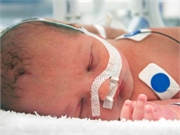Another Possible Effect of Climate Change: More Preemie Babies
By E.J. MundellHealthDay Reporter

MONDAY, Dec. 2, 2019 (HealthDay News) -- Rising temperatures might help trigger premature birth, a new study finds, suggesting that global warming could deliver more "preemie" babies.
Looking at 20 years of data on heat waves and birth timing across the United States, researchers "estimate that an average of 25,000 infants per year were born earlier as a result of heat exposure."
Taken another way, the research suggests that each year, American women lose a total 150,000 "gestational days" due to excess heat -- days that could otherwise have been used bringing baby to a healthy term delivery.
"These findings are important given the emerging evidence that early-life health has a lasting effect on health and cognitive outcomes" for children, said study co-authors Alan Barreca, of the Institute of the Environment and Sustainability at University of California, Los Angeles, and Jessamyn Schaller of Claremont McKenna College in Claremont, Calif.
One ob-gyn unconnected to the new study believes the findings don't bode well for a warming planet.
"Climate change has caused increase in the exposure of pregnant women to extremes of heat, especially in the warmer climates and in areas with an inability to shelter pregnant women from the heat," said Dr. Mitchell Kramer. He's chair of obstetrics and gynecology at Northwell Health's Huntington Hospital in Huntington, N.Y.
Prior research has already suggested that spikes in temperature can lead to an "increase in preterm birth, as well as lower birth weight, and stillbirth," Kramer said.
"More study needs to be done," he said, "but certainly we must help protect pregnant women from extremes of heat as well as work on the causes of climate change."
The new research was published Dec. 2 in the journal Nature Climate Change. In their report, investigators Barreca and Schaller analyzed U.S. government data on weather and birth rates for the years 1969 to 1988.
The data involved a total of 56 million births occurring in counties across the United States.
"We estimate that birth rates increase by 5% on days with maximum temperatures about 90 degrees Fahrenheit," the researchers wrote, though the study could not prove that high temperatures actually caused premature deliveries.
That worked out to 25,000 U.S. births per year that had "some reduction in gestational length," they concluded. The average reduction was about six days, "although some births experience a loss of two weeks," they noted.
How does a very hot day boost the odds of premature birth? According to Barreca and Schaller, "one possible channel for these effects is that heat increases levels of oxytocin, which is a key hormone regulating the onset of delivery." Heat might also put stress on a pregnant woman's cardiovascular system, which may also help trigger early delivery.
Of course, the impact of rising global temperatures on infant health may depend on a pregnant woman's income -- and her access to air conditioning, the researchers said.
So, air conditioning use in billions of homes around the world is expected to rise. However, the emissions generated by power plants to supply all that extra air conditioning will, in turn, boost global warming, the researchers added.
More information
For more about preterm infants, visit the March of Dimes.

The news stories provided in Health News and our Health-E News Newsletter are a service of the nationally syndicated HealthDay® news and information company. Stories refer to national trends and breaking health news, and are not necessarily indicative of or always supported by our facility and providers. This information is provided for informational and educational purposes only, and is not intended to be a substitute for medical advice, diagnosis, or treatment.

